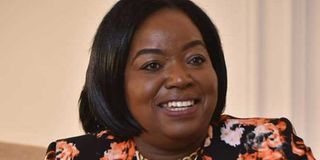Kenya denies fuelling S Sudan conflict

Foreign Affairs Cabinet Secretary Monica Juma who has rejected claims by UN Special Advisor on Prevention of Genocide Adama Dieng. FILE PHOTO | NATION MEDIA GROUP
What you need to know:
But Monday, Juba argued it had the right to buy weapons just like any other country.
Early this month, the US imposed an arms embargo on South Sudan in a bid to compel leaders to stop violence.
However, Washington does not sell arms to Juba, an indication the ban could have little effect.
Kenya has denied a UN claim it was fuelling conflict in South Sudan by allowing the flow of weapons, even as Juba defended its right to buy arms.
In what looked like another tiff with the UN, Foreign Affairs Cabinet Secretary Monica Juma Monday rejected claims by UN Special Advisor on Prevention of Genocide Adama Dieng.
Mr Dieng had claimed Kenya and Uganda were adding fuel to the chaos in South Sudan.
“The allegations by the senior UN official insinuating Kenya’s complicity in trafficking large quantities of weapons and ammunition into South Sudan, are not only unfortunate, but also lack facts,” she said, accusing the official of frustrating efforts by regional countries to bring parties to peace talks.
IMPARTIAL
“Kenya remains impartial with regards to the South Sudanese parties, including the political parties as well as the various armed and non-armed opposition groups, as it rallies the regional governments and the international community to sustain pressure on the parties to recommit to the peace process,” said Dr Juma.
“Kenya remains committed to peaceful resolution of the conflict and will continue to play its mediation role.”
Two weeks ago, Mr Dieng, a Senegalese lawyer, claimed the fighting in South Sudan was mainly because Kenya and Uganda were allowing parties to import arms through their territories.
“It is true that large quantities of weapons and ammunition are flowing into South Sudan through Kenya and Uganda,” he told the Voice of America in an interview at the end of January.
Mr Dieng said peace will be achieved in South Sudan only “if we have concerted regional and international efforts to leave no further options to the South Sudanese leaders to stop and start negotiating”.
He did not say whether rebels loyal to former Vice President Riek Machar and President Salva Kiir’s army were importing weapons.
But Monday, Juba argued it had the right to buy weapons just like any other country.
“We do not get any illegal weapons from any neighbouring country. But, we are a sovereign nation and any sovereign nation has a right to defend itself,” Mr Chol Ajongo, South Sudan ambassador to Kenya told the Nation.
“I cannot tell you where the rebels are getting their weapons because only they can say, but I have never seen an independent military unable to defend itself,” he said.
South Sudan and Kenya have no agreement on controlling the flow of weapons. But the accusation from the UN came just over a year after the UN fired a Kenyan general (former force commander Lt-Gen Kimani Ondieki) in South Sudan for “negligence”, something Nairobi rejected and protested by temporarily withdrawing soldiers in the peacekeeping mission there.
However, Kenya is a member of the Intergovernmental Authority on Development, a regional bloc that supports cessation of hostilities in South Sudan.
Although the UN did not say whether these weapons were legal purchases or smuggled (which would already be illegal), there has been sustained pressure from rights groups and some western powers to have Mr Kiir and Dr Machar sue for peace.
Early this month, the US imposed an arms embargo on South Sudan in a bid to compel leaders to stop violence.
However, Washington does not sell arms to Juba, an indication the ban could have little effect.





